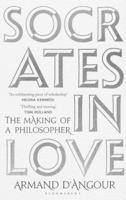
Bloomsbury (2019) h/b 247pp £20.00 (ISBN 9781408883914)
The thesis of this engaging book (‘not written for specialists’) is that Socrates became enamoured of Aspasia, who turned down any putative proposal (possibly of marriage), but instead gave a disquisition on the subject of love, which appears in Plato’s Symposium in the words of the priestess Diotima, as related by Socrates.
After a Preface and a (most valuable) Foreword, the book’s six chapters are: ‘For the Love of Socrates’, ‘Socrates the Warrior’, ‘Enter Alcibiades’, ‘The Circle of Pericles’, ‘A Philosopher is Born’, and ‘The Mystery of Aspasia’. There is also an Afterword: ‘The Unknown Socrates’. Key is the identification of Aspasia with Diotima (= ‘honoured by Zeus’: Pericles was regularly given the nickname Zeus by the comic poets). It was also obviously essential, however, for Socrates to meet Aspasia, and here the person of Alcibiades is of the first importance: Alcibiades—a man for whom the epithet abebaios is far too weak—had actually been saved by the brave action of Socrates at the Battle of Potidaea (432 BC). He was the son of Cleinias (killed in the same battle), a friend of Pericles; and, as Alcibiades and Socrates were themselves close friends, it is clear that a conjunction between Aspasia and Socrates—they were close in age—becomes plausible: they would both have been in their twenties.
D’A. goes to some pains to depict Socrates not as the unappealing figure (the ‘ugly satyr’ of one familiar bust), but as the ‘distinguished thinker’ of another bust, and, indeed, as a well-off, vigorous Athenian. And the book—as the subtitle indicates—is also about Socrates as a philosopher. Here, the reviewer strongly commends the long Foreword, entitled ‘Bringing Socrates in from the Clouds’ (and, one should add, the Clouds): Socrates, said Cicero, ‘brought philosophy down from heaven to earth’ (the reference—Tusc. Disp. 5.iv.10—would have been welcome).
There is much more to this book: an account of the (often deplorable) career of Alcibiades; the brutal conquest by Pericles of Samos (440 BC), possibly accounted for by his wish to gratify Aspasia, whose family came from Miletus, arch-rival of Samos; the evidence of Menexenus as possibly implying an intimate relationship between Socrates and Aspasia; the later evidence of Clearchus (pupil of Aristotle) and Hermesianax (florid poet of 3rd C BC) of Socrates’ ‘passion’ for Aspasia; and, of course, Socrates’ trial and judicial execution.
Nor should we forget—without placing undue emphasis upon it—that Aristophanes, in Acharnians (425 BC), was offensive to Aspasia, as being (absurdly) responsible for the Peloponnesian War, via the notorious Megarian Decree. The play was produced at the Lenaia, at which attendance was (with a few exceptions) limited to Athenian citizens.
The book’s ‘blurb’ talks of its ‘tremendous scholarship’, ‘this brilliant study’, ‘eye-opening … thrilling and moving’. One can imagine the author as thinking, ‘Grazie, non tanti elogi’, with the title character from The Marriage of Figaro: because, engaging, with evidence carefully presented, though the narrative spun here is, the argument is necessarily bolstered by many a ‘may well have’ vel sim. The book is much more than a jeu d’esprit, but—as d’A. tells us at the outset—it is not aimed at specialists. In shortened form, it would make a superb contribution to a Festschrift; and what better book to recommend to a candidate for university, pondering whether or not to read classics? In short, warmly recommended. (There are endnotes, a brief bibliography and an index.)
Colin Leach
